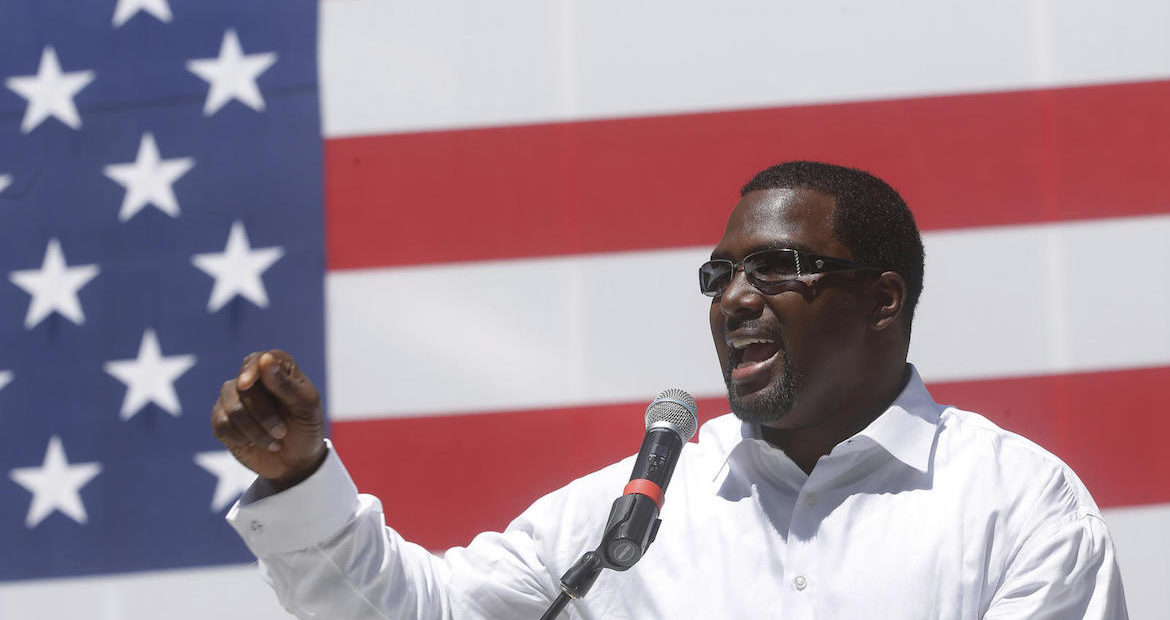
No Sticking To Sports: Former NFL Players Take Political World By Storm
This November, five former NFL players ran for office, and all five won their races. No election cycle has seen this number of ex-NFL players on the ballot.
Former Colts wideout Anthony Gonzalez won a U.S. House seat in Ohio’s 16th district. Napoleon Harris, a linebacker selected in the first-round of the 2002 draft by Oakland, will continue as a state Senator for Illinois’ 15th district. Aaron Rouse, a former NFL safety, won a seat on Virginia Beach’s city council. Former Titans linebacker Colin Allred won a U.S. house seat in Texas’s 32nd district, unseating 11-term congressman Pete Sessions. And Clint Didier, who has two Super Bowl rings from his tenure as a tight end in the 80’s, won election to the Franklin County Commission.
While many in the United States are entrenched in debating about what role athletes should play in the political discourse, their graduation from sports to politics is an on-going trend that is only gaining steam. In fact, the idea of athletes staying out of politics sailed away long ago.
More than 75 years ago, athletes were finding their voices and speaking out on social and political issues. LaVern Dilweg played in the NFL from 1927 to 1934, winning three championships with the Green Bay Packers in 1929, 1930 and 1931. Dilweg concurrently practiced law in Green Bay, merging long-term career with short-term career as many athletes did in those days. After his career in football, Dilweg was elected to Congress in 1942 as a Democrat from the 8th district of Wisconsin paving the way for many football players after him to transition from the NFL to public office.
Jack Kemp, the quarterback for the Buffalo Bills for 7 seasons, ran for Congress in 1971, where he served for nine terms before becoming the Housing Secretary under George H. W. Bush. Steve Largent, a Hall of Fame wide receiver for the Seattle Seahawks, served as a member of the U.S. House for eight years beginning in 1995. Lynn Swann played eight seasons in the NFL with the Steelers before President George W. Bush appointed Swann as the chairman of the United States President’s Council on Physical Fitness and Sports in 2002. Swann later ran for governor of Pennsylvania in 2006.
There are myriad reasons players have made the transition from football to politics. Aaron Rouse, who was elected to the Virginia Beach City Council after playing three seasons in the NFL ,explained his motivation, “It was teachers, first responders and community leaders that helped me to be successful, and these are the same people I wanted to have more of an impact of giving back to.”
Rouse, a sociologist who graduated from Virginia Tech, says it’s natural for athletes to get involved in politics because of what the game teaches you.
“When you look at sports, and it goes for any athlete, not just football players but athletes across the spectrum, what sports allows you to do is work with other people from all sorts of backgrounds,” he said. “[Everyone] has different perspectives, different upbringings, different ways of thinking and if you want to be successful, if you want to win, you have to work together.”
Not only does Rouse see more athletes running for office, he thinks athletes are capable of being the best politicians. “This is what makes athletes running for public office I think some of the best servants, because they understand it’s not about I or me. It’s about team. That’s essentially what our government is at every level. It should be about team and how well we work together to be the voice of the people.”
However, many outside observers disagree with Rouse and believe athletes should “stick to sports,” or more notably “shut up and dribble.”
Harris, who played seven seasons as a linebacker in the NFL with the Raiders, Vikings, and Chiefs and has been a member of the Illinois State Senate since 2013, says athletes must resist the temptation to “stay in their lane.”
“I think it’s important for athletes as a whole to take a stand because they’re built for it,” he said. “They are the ones who have gone through adversity. To get to where they are in life, they’ve had to overcome insurmountable odds. Think about less than one percent of the population become athletes at the professional level. I think it’s important to be true to yourself and, more importantly, I think it’s important to stand for something bigger than you, and that’s the essence of being a professional athlete.”
The precursor to the more recent wave of athletes following a path to politics was paved long ago. A number of athletes have used their platform to stir social change, even if they didn’t run for office. In the 1960s, during the height of the civil rights movement, many athletes were starting to speak out against the racism they felt.
In 1968 at the Olympic Games in Mexico City, Tommy Smith and John Carlos won gold and bronze in the 200-meter sprint. As they took their places on the podium, Smith and Carlos dressed against Olympic code, wearing beads with no shoes on and a black glove on their hands. The men raised their black-gloved fists in a protest against the treatment of black people in the US. Carlos and Smith were banned from competing in any future Olympic games, however, their legacy speaking out against injustice still lives on today. Of course, almost 50 years later Colin Kaepernick famously sat and then kneeled during the national anthem to protest police brutality.
Kaepernick’s protest has sparked an intense political dialogue in which athletes are at the center. We’re in an enlightened era where athletes are expressing their societal concerns be it through the Players Coalition’s work on such issues as bail reform or Cardinals quarterback Josh Rosen opting to spotlight climate change as his My Cleats, My Cause initiative.
The popularity of football puts athletes in an advantageous position when it comes to running for office a players exit the NFL with an already developed brand.
“Athletes just have a different platform than most everyday people have,” Harris says. “They’re viewed as celebrities. People gravitate toward athletes because they are doing something most people don’t do.”
In addition to having a following, players also have a background in speaking to the media, being a part of the 24-hour news cycle and receiving backlash for missed plays or opportunities, which gives them clear advantages to newcomers entering politics. Another notable advantage is that athletes have connections which can help foster campaign contributions or political endorsements.
When starting his campaign Rouse used his connections to reach out to Hall of Fame defensive end Bruce Smith. “He’s from here and he’s been a great mentor [to me] since Virginia Tech. Quite frankly, I don’t think I could have made as much leeway without him. He’s mentored me through this process and helped me so much. I’m so grateful to have Bruce Smith in my corner.”
In addition to Smith, Rouse garnered the support of one of the world’s most followed musicians, Pharrell.
While there are definite advantages to players opting to enter the political arena, Harris warns of the inherent challenges that come along with being an athlete and transitioning to another field.
Harris said even during his campaign the opposition would try to discredit him. “Some campaigns said ‘He’s an athlete. What does he know about politics’,” said Harris as he recounted the attacks on him. “Clearly, I’m more than an athlete. I’m a college graduate; I’m a husband, a father, and a business owner. I’m someone who grew up in the community I want to represent and understand the values and the issues of the community because I lived them.”
These former players turned politicians hope the work they are putting in now to create change inspires the next generation. Virginia Beach City Councilman Rouse says legacy is so important and strongly encourages other NFL players to follow his path into politics. “I tend to hope so especially because sports at every level teaches you to work with different people. We have a diverse country, and this is what makes America the greatest country in the world. We need to get back to that.”



